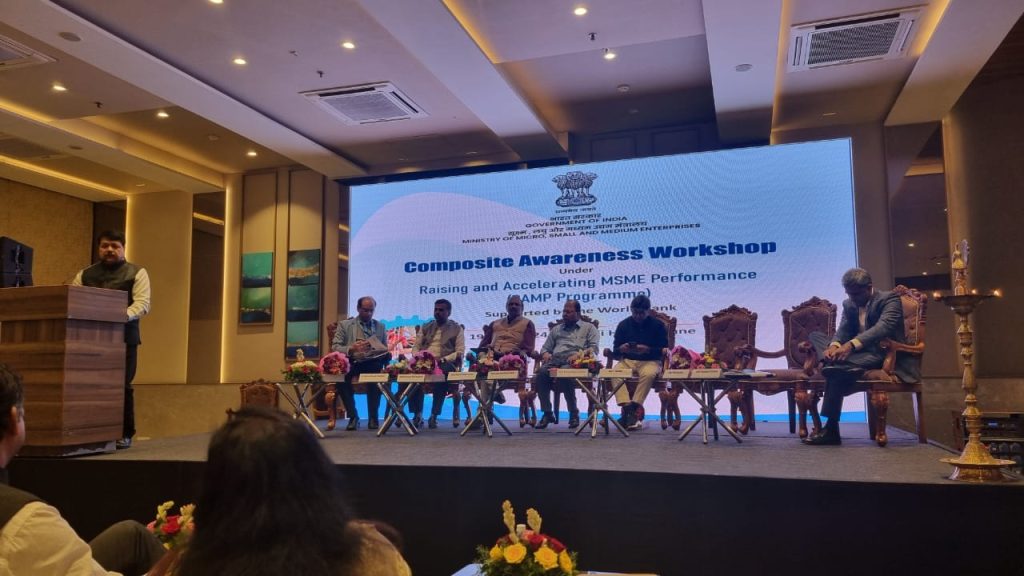Syllabus:
GS 3: Indian Economy and issues relating to Planning, Mobilization of Resources, Growth, Development and Employment.
Context:
Recently, NITI Aayog released the report on Enhancing MSMEs Competitiveness in India.
About the Report

- NITI Aayog in collaboration with the Institute for Competitiveness (IFC) released a detailed report that outlines a roadmap for strengthening the role of Micro, Small, and Medium Enterprises (MSMEs) in India’s economic growth.
- The report analyses textiles, chemicals, automotive and food processing sectors, highlighting structural and policy gaps hindering MSME competitiveness in India.
- The report delves into the key challenges affecting the competitiveness of MSMEs in India.
- It uses firm-level data and the Periodic Labour Force Survey (PLFS) to frame its recommendations.
Key Findings and Challenges Highlighted in the Report
- There is an improvement in formal credit access for MSMEs from 2020 to 2024, with micro and small enterprises’ bank credit rising from 14% to 20%, and medium enterprises from 4% to 9%. Still, only 19% of credit demand was met by FY21, leaving a shortfall of ₹80 lakh crore.
- The Credit Guarantee Fund Trust for Micro and Small Enterprises (CGTMSE) has expanded in recent years but continues to face operational challenges.
- The report highlighted the pressing issue of skill shortages within the MSME sector.
- It observes that a substantial portion of the MSME workforce lacks formal technical or vocational training, affecting both productivity and scalability.
- Moreover, limited investment in research and development, quality enhancement, and innovation has adversely impacted the global competitiveness of these enterprises.
- Inadequate electricity supply, poor internet connectivity, and high implementation costs have discouraged digital transition, despite state-level schemes aimed at supporting such upgrades.
- The report flags outdated technology and poor branding as major constraints, stressing the need to boost scheme awareness, data integration, and policy monitoring.
- Despite recent policy efforts, the report finds their impact limited by low awareness and uneven state-level implementation.
- Export Promotion: In FY 2021–22, MSMEs accounted for nearly 45% of India’s total exports, playing a vital role in boosting the country’s presence in global trade.
- According to the Udyam Registration Portal, more than 20% of MSMEs are owned by women, reflecting the increasing involvement of women in India’s entrepreneurial landscape.
Challenges Highlighted by NITI Aayog
- High Informatization: Informality remains a primary characteristic of MSMEs in India, with more than 90% operating informally; only a meager 9% of registered firms provide any semblance of a transitionary pathway for unregistered entities.
- Formal Credit Access Gaps: While there was an improvement in credit access for MSMEs from 14 percent to 20 percent for micro and small enterprises and 4 percent to 9 percent for medium enterprises from 2020 to 2024, it indicates that a wide credit gap among them still exists.
- The Missing Middle Problem: Several MSMEs continue to remain below the radar despite incorporation of various policies like ECLGS and Startup India owing to lack of awareness and understanding of those policies which makes them difficult to access.
- Skilled Gaps: Data reflects that skilled manpower grew at 19.94% in Small, 20% in Medium, and 12.72% in large enterprises—evidencing the unpreparedness of the workforce remains a challenge.
Way Forward
Enhancing Access to Finance:
- The report calls for a revamped CGTMSE with targeted support and stronger institutional ties to bridge the credit gap.
- Encourage wider adoption of Trade Receivables Discounting System (TReDS) platforms to address the issue of delayed payments by large buyers, improving the cash flow of MSMEs.
Enhancing Market Access and Competitiveness:
- Support MSMEs in adopting e-commerce platforms to expand their market reach.
- Offer support and incentives for MSMEs to join global trade fairs and access export guidance and market insights.
Improving Infrastructure and Logistics:
- The report recommended a more adaptive, cluster-based policy framework that strengthens state-level execution, fosters innovation and builds market linkages.
- Ensure reliable and affordable internet access across all regions to facilitate digital adoption and e-commerce for MSMEs.
Mains Question:
PYQ. Faster economic growth requires increased share of the manufacturing sector in GDP, particularly of MSMEs. Comment on the present policies of the Government in this regard. (2023)

